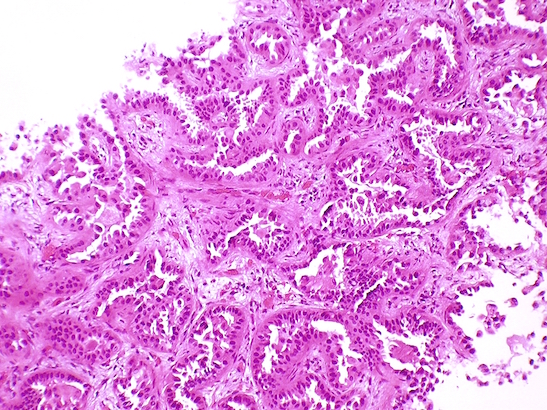-945x532.jpg)
Non-small cell lung cancer. Credit: Dr Ed Uthman-Yale Rosen-Flickr (CC BY-SA 2.0)
Targeting an enzyme that helps cells to generate energy could trigger cell death and be a way to treat some forms of lung cancer, even where the effect of chemotherapy is limited.
A common genetic defect in non-small cell lung cancer cells means they produce low levels of a key protein called ERCC1, which helps repair DNA damage in cells.
Because DNA repair is already weakened in these cancer cells, targeting core cell processes, like energy production, puts extra pressure on them and force them to die. This approach is known as synthetic lethality, where cancer cells with specific defects are targeted.
This research, carried out at the Institute of Cancer Research, London, suggests it could prove an effective way to treat lung cancer – the leading cause of death from cancer worldwide. The results of this study were published in The Journal of Clinical Investigation.
Putting additional pressure on weakened cells
Scientists at the ICR, together with colleagues at the Institut Gustave Roussy, France, received funding from, the French National Cancer Plan, the INSERM-CNRS research institutions and the European Union, to identify a synthetically lethal relationship between ERCC1 and the energy production enzyme NAMPT in lung cancer.
Cells with low ERCC1 activity displayed significantly lower levels of NAMPT, and were 1,000 times more sensitive to NAMPT inhibitors, which block the activity of NAMPT, compared with lung cancer cells with normal levels of ERCC1.
When the ICR researchers blocked NAMPT activity in mice with lung cancer, this significantly reduced tumour growth compared with untreated mice, and this effect was much more profound in tumours lacking ERCC1.
Importantly, blocking NAMPT activity was also effective when only one copy of the ERCC1 gene was deficient, which is linked to a lack of response to standard platinum-based chemotherapy in patients with lung cancer.
Research at the ICR is underpinned by generous contributions from our supporters. Find out more about how you can contribute to our mission to make the discoveries to defeat cancer.
A potential new lung cancer treatment
Dr Sophie Postel-Vinay, senior co-author of the study, said: "Lung cancer is the biggest cause of cancer-related death, but many lung cancers have deficiencies in mechanisms that repair DNA damage, so targeting these represents a potential route for new treatments.
"Our study found that ERCC1-deficient lung cancer cells have abnormalities in metabolic processes that generate energy in cells and are exquisitely sensitive to drugs that inhibit the metabolic enzyme NAMPT.
"Blocking NAMPT pushes ERCC1-defective cancer cells to the point where they cannot survive, and we think it's one of the first examples of strong dependencies between DNA repair and metabolic mechanisms.
"Excitingly, the treatment also works for a type of lung cancer where standard chemotherapy doesn't, so it could potentially be a potent new treatment for ERCC1-defective lung cancer."
